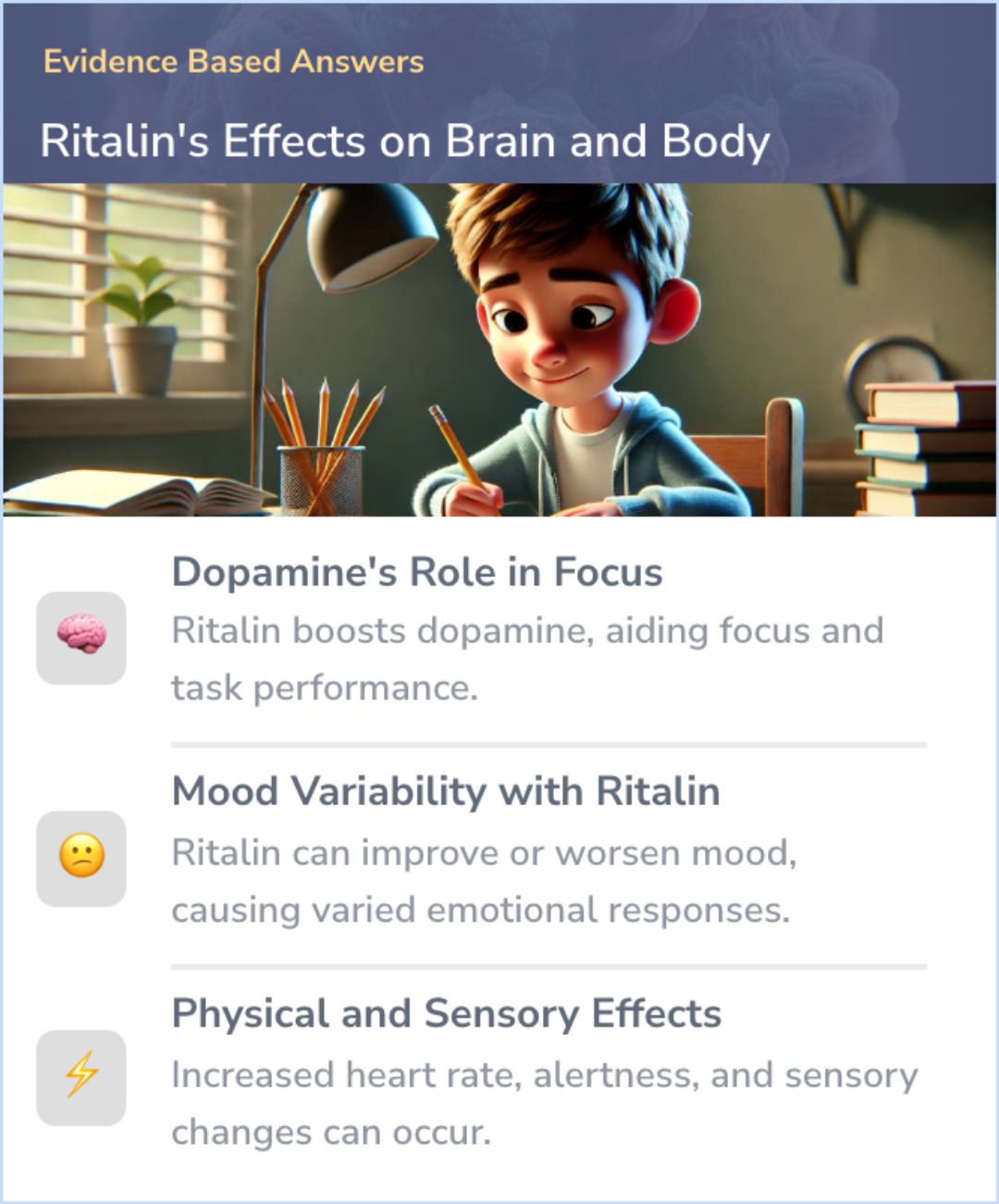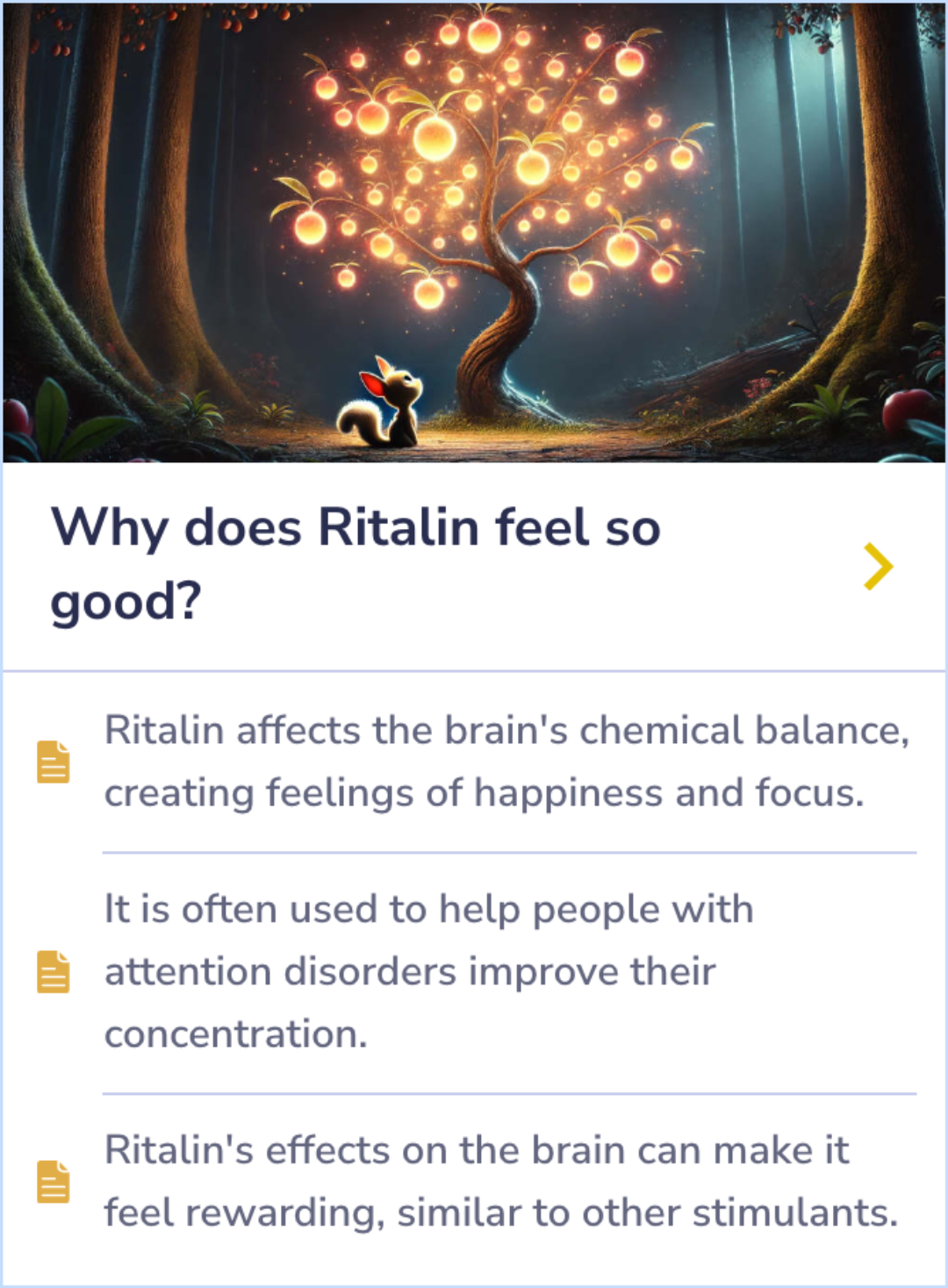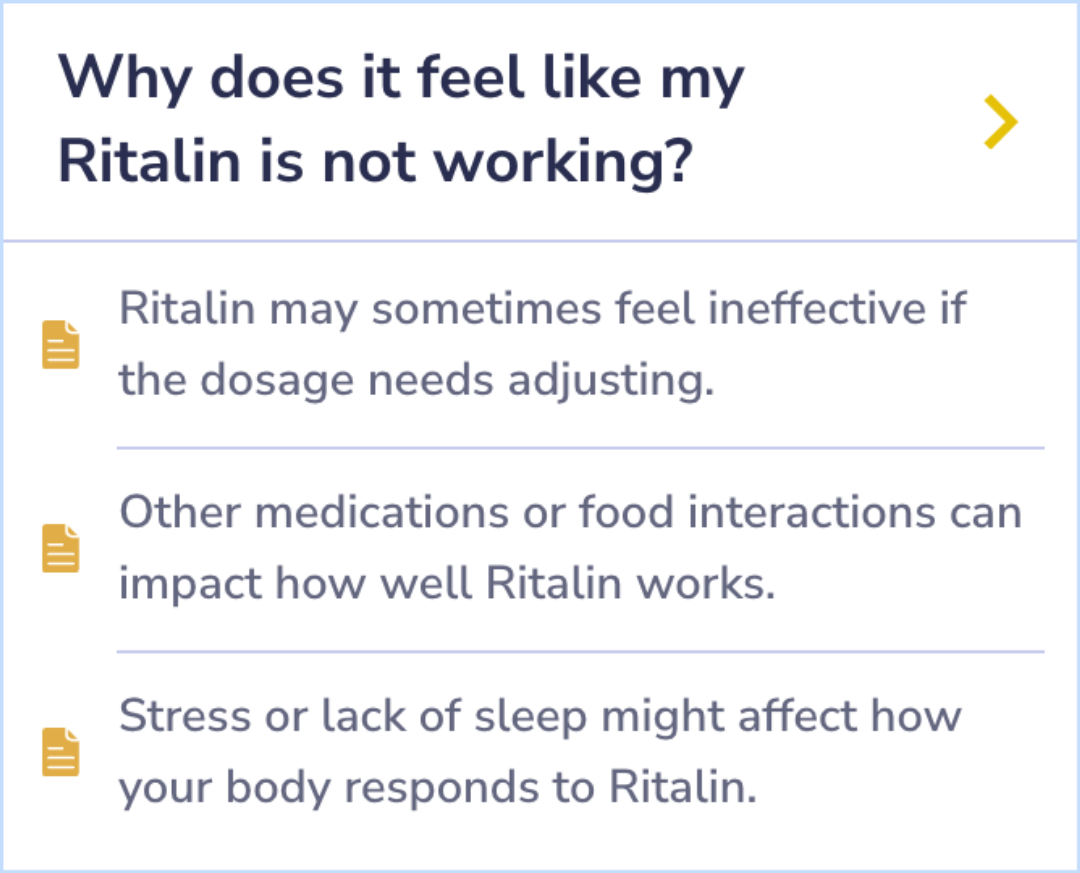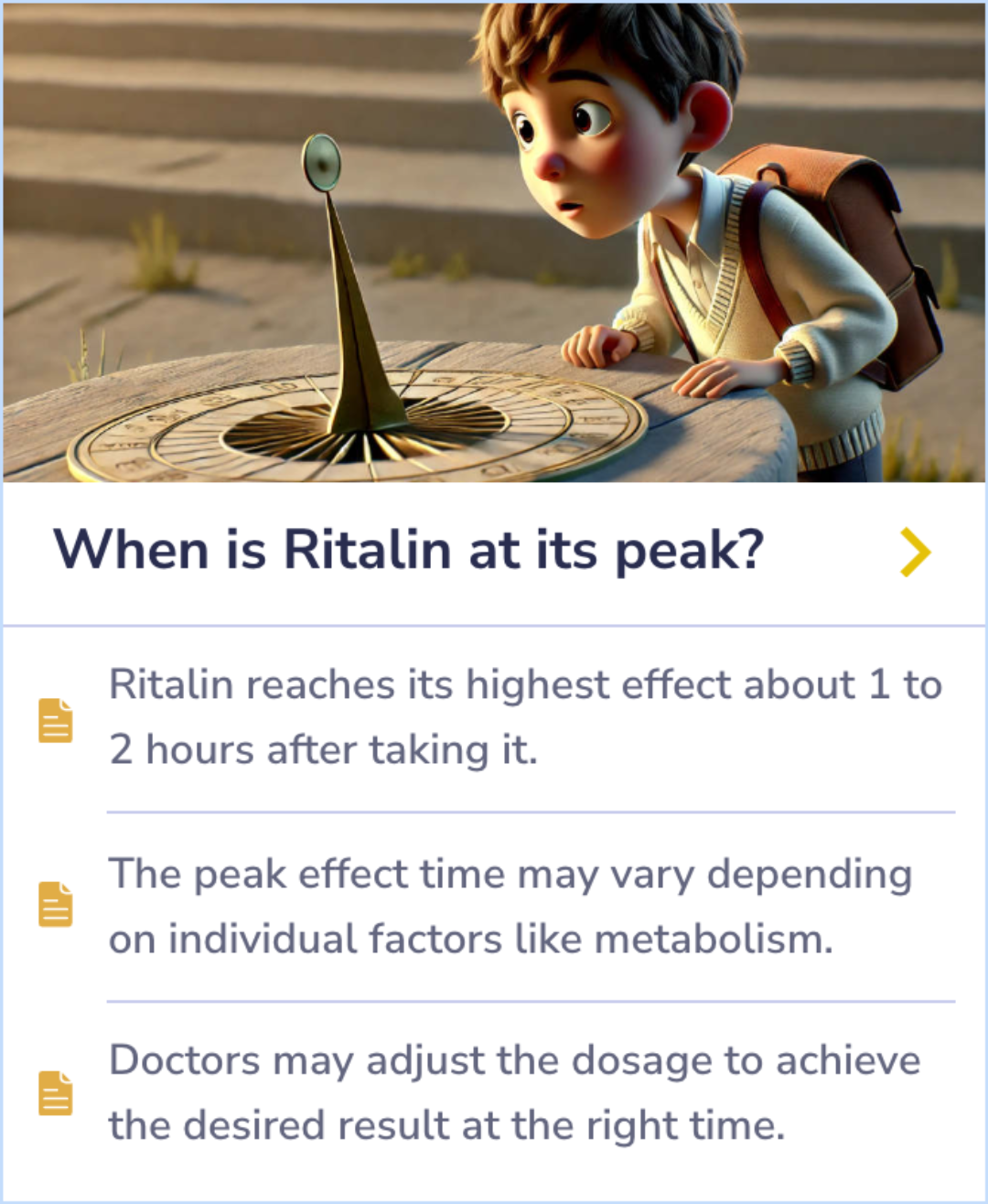Ritalin
Evidence Based Answers
How is Ritalin supposed to make you feel?
Taking Ritalin without ADHD can enhance focus but also poses risks. It affects dopamine, mood, and physical sensations, with outcomes varying by dosage and individual chemistry.
Published: November 8, 2024
Click to explore a section:

Ritalin boosts dopamine, affecting focus, mood, and physical sensations, with varied responses influenced by individual chemistry and dosage.
Background: Effects on ADHD and Narcolepsy
Ritalin is primarily prescribed for ADHD and narcolepsy, conditions that involve challenges with focus, impulse control, and managing energy. Ritalin helps balance these issues by acting as a stimulant, increasing activity levels and aiding in attention.
For those taking Ritalin, responses can vary widely. While some individuals may experience heightened mood, activity, and arousal, others may feel anxious, agitated, or even tired. It is part of a broader treatment approach that often includes other forms of support to optimize outcomes.
For those taking Ritalin, responses can vary widely. While some individuals may experience heightened mood, activity, and arousal, others may feel anxious, agitated, or even tired. It is part of a broader treatment approach that often includes other forms of support to optimize outcomes.
Personal Experiences
Perspectives: What Does Ritalin Feel Like?
In discussions on Ritalin's effects, people shared varied experiences. Some found it calming, with increased focus and reduced impulsivity, while others mentioned initial euphoria fading over time.
Another perspective emphasized brain fog or tiredness at low doses, and some noted that side effects, like appetite suppression, can influence how they feel on the medication. Overall, responses highlighted both benefits and challenges associated with Ritalin use.
Another perspective emphasized brain fog or tiredness at low doses, and some noted that side effects, like appetite suppression, can influence how they feel on the medication. Overall, responses highlighted both benefits and challenges associated with Ritalin use.
Reddit: u/CorazonLock
Initially, it made me really relaxed and almost sleepy... I feel like my brain is a bit more active and less sluggish. Also, I sleep really well on it.How Ritalin Boosts Focus Through Dopamine
Ritalin mainly works by boosting dopamine levels in the brain, which is linked to improved attention and motivation.
It does this by blocking dopamine reuptake, which allows dopamine to remain active longer, enhancing focus and making it easier to ignore distractions.
This effect can improve attention and task performance for many, though individual responses vary.
It does this by blocking dopamine reuptake, which allows dopamine to remain active longer, enhancing focus and making it easier to ignore distractions.
This effect can improve attention and task performance for many, though individual responses vary.
“
Source Quotes:
Methylphenidate binds to the dopamine transporter in the presynaptic cell membrane, blocking reuptake of dopamine and causing a resultant increase in extracellular dopamine levels.
The therapeutic effects of methylphenidate and amphetamine have also been related to their ability to increase extracellular dopamine.
Mood and Emotional Changes with Ritalin
Ritalin’s impact on mood can differ widely between individuals. Some people feel more focused or energized, while others may experience irritability or mood swings.
In some cases, Ritalin can even cause dysphoria, a feeling of unease, especially at higher doses.
This variation in mood response means that Ritalin’s effect is not always positive and can depend on personal sensitivity and dosage.
In some cases, Ritalin can even cause dysphoria, a feeling of unease, especially at higher doses.
This variation in mood response means that Ritalin’s effect is not always positive and can depend on personal sensitivity and dosage.
“
Source Quotes:
Methylphenidate tends to increase activity, arousal, talkativeness and mood in normal subjects. However, responses are highly individual, with some experiencing anxiety, dysphoria, and tiredness.
Patients are more prone to become easily agitated, irritable, or depressed and go through mood swings/lability.
Physical and Sensory Responses to Ritalin
Ritalin may lead to physical changes, such as slight increases in heart rate and blood pressure, which can make some users feel more alert.
These effects are usually mild but can be more noticeable at higher doses.
Some users also report increased sensory awareness, which can sometimes heighten distractibility, showing how stimulants like Ritalin affect the senses and physical state differently.
These effects are usually mild but can be more noticeable at higher doses.
Some users also report increased sensory awareness, which can sometimes heighten distractibility, showing how stimulants like Ritalin affect the senses and physical state differently.
“
Source Quotes:
Methylphenidate was repeatedly shown to increase heart rate and blood pressure.
Stimulant medications cause a modest increase in average blood pressure (about 2-4 mmHg) and average heart rate (about 3-6 bpm), and individuals may have larger increases.
Key Takeaways
Conclusions
Ritalin enhances focus by increasing dopamine levels, improving brain signal clarity, yet individual experiences vary widely. Some benefit from improved attention and task performance, while others may find limited changes influenced by brain chemistry and dosage.
In terms of mood, responses to Ritalin are highly variable; it can energize or cause irritability, anxiety, or even dysphoria, particularly at higher doses. Physical effects, like increased heart rate and alertness, are generally mild and dose-dependent, with sensory changes influenced by dosage.
In terms of mood, responses to Ritalin are highly variable; it can energize or cause irritability, anxiety, or even dysphoria, particularly at higher doses. Physical effects, like increased heart rate and alertness, are generally mild and dose-dependent, with sensory changes influenced by dosage.

Evidence Summary
How Ritalin Enhances Focus and Motivation
Ritalin affects brain chemicals to enhance focus and produce a rewarding sense of motivation, which many find helpful for attention issues.
By adjusting the brain’s chemical balance, it not only boosts concentration but also creates a feeling of happiness similar to other stimulants.
This makes Ritalin a commonly used aid for those with attention disorders, helping to manage focus and engagement in tasks.
By adjusting the brain’s chemical balance, it not only boosts concentration but also creates a feeling of happiness similar to other stimulants.
This makes Ritalin a commonly used aid for those with attention disorders, helping to manage focus and engagement in tasks.
Evidence Summary
Factors Influencing Ritalin’s Effectiveness
Ritalin may seem to lose its impact if the dose needs adjustment, making it feel less effective for some. Small dosage tweaks can sometimes restore its effects.
Certain foods and medications can interfere with how Ritalin works, altering its effectiveness. Such interactions can create a mixed or weaker response.
External factors like stress and lack of sleep can also play a role, potentially dampening how your body responds to Ritalin’s effects.
Certain foods and medications can interfere with how Ritalin works, altering its effectiveness. Such interactions can create a mixed or weaker response.
External factors like stress and lack of sleep can also play a role, potentially dampening how your body responds to Ritalin’s effects.
Evidence Summary
Timing Ritalin’s Peak Effect for Best Results
Ritalin generally reaches its peak effect between 1 to 2 hours after taking it, though this timing can vary based on personal factors, such as metabolism.
Doctors may fine-tune doses to help individuals experience Ritalin’s effects at the most beneficial time for their needs, adjusting as necessary to find the right balance for each person.
Doctors may fine-tune doses to help individuals experience Ritalin’s effects at the most beneficial time for their needs, adjusting as necessary to find the right balance for each person.


